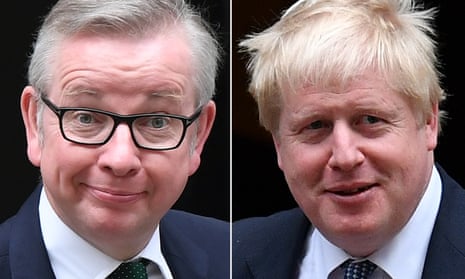The Conservatives didn’t drop to a 9% vote share in the European election without losing a chunk of voters to remain parties(there was a major swing to the Lib Dems), but they will hear only one message: they are under threat from Nigel Farage.
That message is probably correct. The Brexit party, which Farage formed only four months ago, has just won a national election, and it has done it on Tory territory. The Conservatives are also a Brexit party, but one at a considerable disadvantage: they are the dopes tasked with delivering the thing. As such, they have been entirely unable to capture its spirit, which is something naturally allergic to the practicalities of leaving Europe – purist, anti-institution and scornful of compromise. All this was rammed home to Tory MPs by the results, with the added reminder that the leave-remain split is not going away any time soon.
The first and obvious consequence for the Tory leadership contest is that it will help Boris Johnson, already the clear frontrunner. Conservative MPs are even more firmly convinced that they need a leader with the goods Johnson offers: a Brexiteer prepared to deliver the purest form of Brexit – no deal – and who is capable of the same kind of mass voter seduction as Farage.
“All roads seem to lead to Boris Johnson,” one moderate MP told me. “This just hardens the mood.”
The results also show Tories how polarised the debate has become (any party trying to tread the dividing line was punished), and here Johnson has another advantage. His bumpy relationship with the truth has led him to the only strategy that really works in persuading MPs from the other side of the argument: allow them to hope you might not mean what you say. Come up with a compromise strategy and you put people off, but keep things vague enough and you may just unite them. According to party Brexiteers, then, Johnson is telling moderate MPs they need a leader who “at least comes across as populist”, while reassuring them he is, secretly, “at his core, a one-nation Tory”.
The second answer concerns the second runner in the race, which is where the results of the EU election may really start to shift allegiances. The parliamentary party must select two candidates, who will then compete for the votes of the party membership. The European results will send a message that the winner at the membership stage will probably be a Brexiteer and not a compromiser (compromisers got crushed). As one MP put it to me, “the narrative that it has to be a Brexiteer has become overpowering”. And this has given moderate Tory MPs, who want to beat Johnson, something to think about.
Remainer Tories had been gathering around various middle-of-the-road candidates – Jeremy Hunt, Sajid Javid, Matt Hancock – but some think that these “unity” challengers have now been dealt a fatal blow. Instead, attention is turning to Michael Gove, who is seen as the most moderate of the original leavers. He has the Brexiteer pedigree to appeal to party members who mistrust those choosing their Brexit positions in the spirit of reluctance, but who has also been critical of no deal, which may induce remainer Tories to consider him the least worst option. “I can see the remainer/one nation lot eventually backing Gove if he is the least hard Brexit of the true Brexiteers,” one Tory insider tells me. “They are realising that even if they managed to get a soft continuity old remainer into the last two, they just wouldn’t win.”
Could we be in line for a Gove-Johnson final showdown? Some Tory MPs fear the spectacle would harm the party, pushing it into more extreme territory. “A Brexiteer-on-Brexiteer contest will be deeply damaging,” one told me. “A Boris coronation is OK … A remainer (who accepts Brexit) will drag the contest to the middle ground. Brexit vs Brexit makes us look crazy”.
Others relish the prospect. “Given how half-hearted everyone seems to be about the whole leadership election (what is it really going to change?), the prospect of Gove-Johnson is one of the few things that livens people up,” a Tory adviser told me, recalling the spectacular fight between the two that kicked off the party’s “Brexit years”.
“To quote Karen in Will & Grace: ‘Grab a bottle, hunker down, and pray for daylight’,” he said. And then: “But there is no daylight.”

